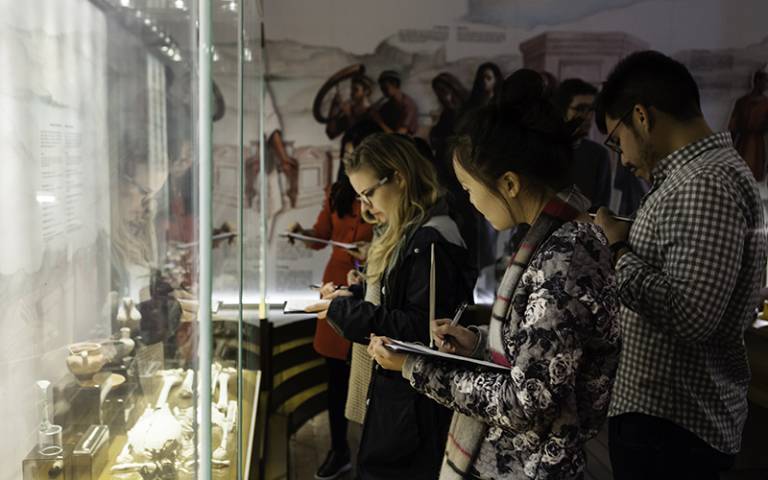Sustainable Heritage Research Seminar 2019
6 November 2019
On Tuesday 12th November, ISH academics will host a student research showcase at UCL Central House. The presentations will capture the range of outstanding research developed in the Institute and will be followed by a networking reception.

12 November 2019, Central House
18:00 – 20:30
Evening programme:
| 18:00 | Doors open |
|---|---|
| 18:15 | Welcome by ISH academics |
| 18:20 | Alex Rowe – Factors Affecting Integrated Pest Management in Heritage Establishments |
| 18:35 | Vanessa Orellana Gutierrez – Adaptive Reuse: Is it Related to Gentrification? |
| 18:50 | Siew Jing Ting – Impact of Statutory Consultation Procedure in the English Planning System: A study of the role of The Gardens Trust |
| 19:05 | Putri Melati - The Revival of Traditional Craftsmanship Supported by Conservation Projects: Is It Sustainable? |
| 19:20 | Drinks reception |
Click below to discover abstracts for each presentation:
- Speaker: Alex Rowe
Factors Affecting Integrated Pest Management in Heritage Establishments This research investigates the factors affecting IPM schemes in heritage establishments, first identifying them through a literary analysis of IPM publications, and then interviews with heritage professionals in direct contact with schemes.
The six factors identified were:
1. Integration and collaboration;
2. Communication;
3. Training;
4. Staff engagement;
5. Heritage context;
6. Resources.The factor found to have the largest influence over IPM was heritage context. These findings mostly pertained to building type, use, location and climate, which seemed to increase the obstacles and challenges to negotiate when trying to best control pests. Due to the limited sample size, the abstractions from this data cannot be generalised to larger populations of heritage employees. However, as there is a sincere lack of criticism of IPM in heritage literature, this paper hopes to provide the basis for understanding the factors most frequently encountered when troubleshooting IPM schemes, to be explored further in future research.
- Speaker: Vanessa Orellana Gutierrez
Adaptive Reuse: is it Related to Gentrification? Within Heritage Conservation, Adaptive Reuse has been identified as a sustainable and resilient strategy, broadly applied in different spaces to meet actual needs. However, it is also recognized in its application the tendency to cover mostly environmental and economic aspects of sustainability. In the scenario where social aspects are not being considered, it has not been explored the influence or link of Adaptive Reuse with processes of Gentrification.
This research aims to develop a major understanding of the interrelation between these two concepts within heritage areas. It is intended to recognized the aspects that led to adaptive reuse and gentrification as individual processes, to analyse the aspects that can contribute to its correlation, to analyse a case study and to describe the impacts identified, according to the data obtained and analysed. The case study, Plaza San Francisco, in Cuenca Ecuador, offers a fruitful scenario where Adaptive Reuse as its decision-making process and actors can be analyzed.
- Speaker: Siew Jing Ting
Impact of Statutory Consultation Procedure in the English Planning System: A Study of the Role of The Gardens Trust In England, the historic environment is mainly protected through the implementation of planning system. Albeit missing statutory protection, it took 36 years for historic parks and gardens to receive similar legislative recognition, as historic buildings and ancient monuments through the establishment of the ‘Register of Parks and Gardens of Special Historic Interest in England’.
From the perspective of The Gardens Trust as a statutory consultee, this research identifies the efficiency and level of impact of planning consultation policies on planning applications involving historic parks and gardens by analysing the performance of the Trust in planning consultation process as well as evaluating comments and decisions on planning applications. Focussing on four counties (Hertfordshire, Devon, Gloucestershire and Derbyshire), the findings confirm a degree of ignorance among local planning authorities and reveal multiple issues in the current planning consultation procedure.
- Speaker: Putri Melati
The Revival of Traditional Craftsmanship Supported by Conservation Projects: Is It Sustainable? Throughout history, the industry of craftsmanship has changed following the development of technology. Some of the traditional ones have successfully survived, yet others are still struggling on the edge of endangerment. Conservation projects in historic places have brought back the demand for some traditional craftsmanship. It is interesting to see the relation between them and to analyse it further: how long the revival would last? Is it sustainable? What happens after the project ends?
Aiming to explore the sustainability of the revival of endangered traditional building crafts that is particularly driven by conservation projects, this dissertation used qualitative method through literature review and interviews for data collections. Using a case study of encaustic tile in the Palace of Westminster, the findings showed that conservation projects play a vital role in the sustainability of traditional building crafts. However, the continuity of conservation project itself still cannot be ascertained as heritage industry in general highly depends on the broader economic situation.
 Close
Close

